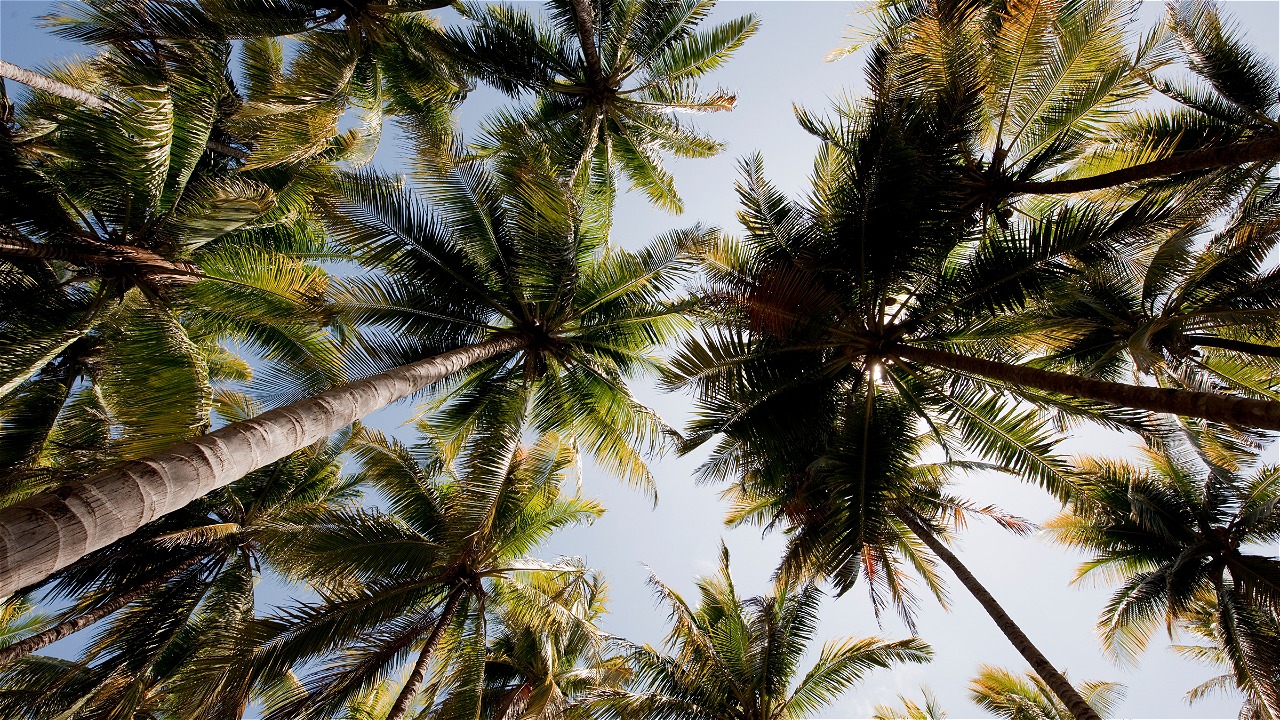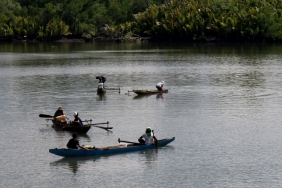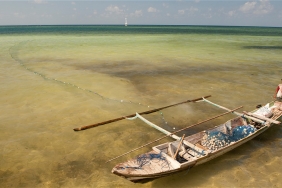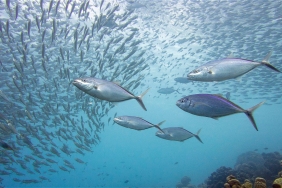GETTING TO KNOW SARANO WALI, THE WAKATOBI CUSTOMARY SYSTEM (4)
Authors: Rinto Andhi (Social Development Coordinator) and Sadar (Marine Conservation Outreach and Awareness Officer), WWF-Indonesia Program Southern Eastern Sulawesi Subseascape/SESS
Indicator Kaombo Still Effective and Running
Kaombo is a natural resource governance system in the Sarano Wali worship area. kaombo, namely: boundaries, rules, rights, authorities, sanctions, conflict resolution mechanisms against violations of kaombo, and monitoring systems. In the previous article, we discussed three of them.
Here are the indicators in reviewing the fourth to seventh institutional kaombo:
- Authority
In the management pattern of kaombo,there is dapura (three stoves) leadership, which means that there are three leaders who have the right to make decisions together with the community. The three authorized leaders are Lakina - and its descendants function to regulate the kaombo with keadata, Imam - and its descendants function to regulate religion related to muamallah matters, and Lurah - and its descendants function to regulate community relations, customary and religious institutions with government administration.
- Sanctions (karambici)
There are three sanctions against violators of kaombo rules, namely light sanctions in the form of warnings, medium sanctions in the form of stern warnings and severe sanctions in the form of social punishment or fines. The sanctioning mechanism is preceded by a ritual with traditional rituals, and gathering at the baruga Sarano Wali. This is done to inform the entire Wali community that there has been a violation of the kaombo rules. The sanctioning is led by sara hokumu consisting of sara kasisi (priest) and sara adati (lakina). In sanctioning violations of the kaombo, there is a fine system called bhoka, about Rp. 24,000. The sanction system in Sarano Wali is a social sanction for perpetrators of violations of customary values and collective agreements.
Type of offense
Fine (bhoka)
Nominal (IDR)
Clams attached to coral
25 bhoka/head
Rp 600.000,-
Turtles (green turtles and hawksbill turtles/sea turtles) or similar
150 bhoka/head
Rp3.600.000,-
Turtle eggs (green turtle and hawksbill turtle/sea turtle) or similar
25 bhoka/grain
Rp600,000,-
Dolphin, Whale (Bungkulawa) and Mermaid (Dhiu), 250 bhoka/head
Rp6.000.000,-
Akar bahar (pantoga)
15 bhoka/tree
Rp360.000,-
Coral stone (sahasa)
42 bhoka/batang
Rp1.008.000,-
Fish bomb
1042 bhoka/violations
Rp25.008.000
Potassium
280 bhoka/violation
Rp6.720.000,-
Akar tuba
100 bhoka/batang
Rp2.400.000,-
The use of compressors in retrieving sea products
1042 bhoka
Rp25.008.000,-
Table of violation types, customary fines, and nominal rupiah
Source: WWF SESS, Participatory Mapping FGD Sarano Wali,2015.
- Conflict Resolution Against Violations of Kaombo
Conflict resolution mechanisms are carried out using customary rules through a humanitarian and family approach. If the violator is the Wali community, then it is resolved with kinship. The deterrent effect for violators is in the form of social sanctions, namely being ostracized by the community. If the violator is an outsider, it will be consolidated with the ruler of the violating community, then tried and sentenced. If the violation causes a public problem related to crime, it will be handed over to the authorities with the case previously resolved by adat.
- Supervision System
In the structural state of affairs, there are kaombo pesisir supervisors called cungguno pasi (coral guards, fishermen's catch location organizers), cungguno maranggo (sara/adat forest guards, including mangroves), and cungguno ngapa (beach guards). In addition to the guards, supervision also involves all elements of society to monitor the coastal kaombo.
The activities to strengthen the customary institutions of Sarano Wali and kaombo are strongly supported by the indigenous people of Sarano Wali and the Wakatobi National Park Office. This is evidenced by the enthusiasm of traditional leaders and village governments on Binongko Island and positive support for the management of conservation areas in Wakatobi.
During the mentoring process and field activities, the spirit to reactivate the customary system of Sarao Wali and Kaombo, was born from the desire of the Cia-Cia ethnic community. The leaders and most of the parents were worried about the loss of culture and tradition among the younger generation. There are several requests from the community and the Wakatobi National Park Office to WWF-Indonesia SESS Program, such as the expected commitment of WWF with the indigenous people of Sarano Wali in strengthening the customary institution of Sarano Wali; help facilitate and encourage the government in conservation programs and customary institutions in strengthening the capacity of customary revitalization Sarano Wali; and help facilitate a joint agreement with the "three stoves" regulatory system through the leadership system dapura (Lurah-Lakina-Imam) in all areas of the ethnic village / kelurahan Cia-Cia on Binongko Island.
(finished)





